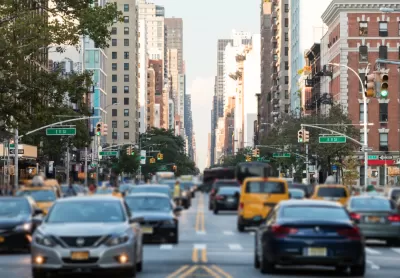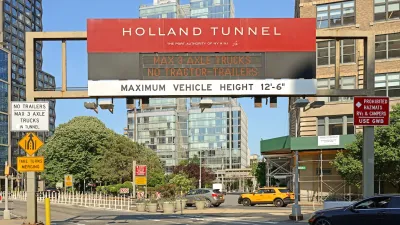Hundreds of people signed up to speak at the city’s first public meeting on the long-delayed plan to charge drivers entering Manhattan’s Central Business District.

New Yorkers got their first opportunity to comment on the city’s proposed congestion pricing plan in the first of six public hearings on the issue. As Catalina Gonella and Phil Corso write in Gothamist, “The plan, which would toll drivers in Manhattan south of 60th Street as much as $23 during rush hour, was designed to lessen traffic congestion by as much as 20%, according to an MTA analysis.”
Close to 400 people signed up to speak at the meeting, which ran late into the night last Thursday. Some expressed concern about the cost to residents in communities that lack subway stations or round-the-clock bus service, such as senior citizens who travel to Manhattan for medical appointments. Others showed support for the plan, hoping it will help improve transit and reduce pollution and traffic deaths.
According to the article, “The affected toll zone, dubbed the ‘Central Business District,’ draws roughly 7.67 million people on the average weekday, according to an MTA study. The capital plan was last pegged at $56 million with about 30% of that being covered by the congestion pricing proposal, the MTA said.”
The program, which was originally scheduled to start collecting revenue in 2021, was delayed repeatedly, including earlier this year when the Federal Highway Administration (FHA) asked the city to answer hundreds of additional questions regarding its environmental impact assessment.
FULL STORY: Commuters sound off at MTA’s first congestion pricing public hearing

Planetizen Federal Action Tracker
A weekly monitor of how Trump’s orders and actions are impacting planners and planning in America.

Canada vs. Kamala: Whose Liberal Housing Platform Comes Out on Top?
As Canada votes for a new Prime Minister, what can America learn from the leading liberal candidate of its neighbor to the north?

The Five Most-Changed American Cities
A ranking of population change, home values, and jobs highlights the nation’s most dynamic and most stagnant regions.

San Diego Adopts First Mobility Master Plan
The plan provides a comprehensive framework for making San Diego’s transportation network more multimodal, accessible, and sustainable.

Housing, Supportive Service Providers Brace for Federal Cuts
Organizations that provide housing assistance are tightening their purse strings and making plans for maintaining operations if federal funding dries up.

Op-Ed: Why an Effective Passenger Rail Network Needs Government Involvement
An outdated rail network that privileges freight won’t be fixed by privatizing Amtrak.
Urban Design for Planners 1: Software Tools
This six-course series explores essential urban design concepts using open source software and equips planners with the tools they need to participate fully in the urban design process.
Planning for Universal Design
Learn the tools for implementing Universal Design in planning regulations.
New York City School Construction Authority
Village of Glen Ellyn
Central Transportation Planning Staff/Boston Region MPO
Institute for Housing and Urban Development Studies (IHS)
City of Grandview
Harvard GSD Executive Education
Regional Transportation Commission of Southern Nevada
Toledo-Lucas County Plan Commissions




























